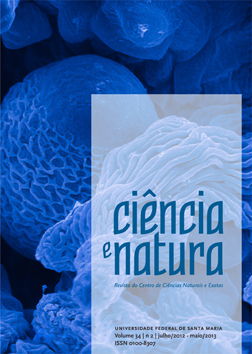Mapeamento dos Conflitos no Uso da Terra em Áreas de Preservação Permanente na Microbracia Hidrográfica do Córrego Capitão Décio, Nova Xavantina – MT
DOI:
https://doi.org/10.5902/2179460X9346Resumo
As áreas de preservação permanente (APPs) são ecossistemas que possuem relevante importância para o equilíbrio do meio ambiente, preservando a qualidade da água, flora e fauna associadas. As APPs foram criadas para proteger o ambiente natural, não permitindo nelas alteração do uso da terra. O presente estudo teve como principal objetivo o mapeamento das áreas de conflito de uso nas APPs. O trabalho foi desenvolvido na microbacia hidrográfica do córrego Capitão Décio (MHCCD), localizada no município de Nova Xavantina – MT. Utilizando técnicas de processamento digital de imagens e geoprocessamento, foi possível mapear sete classes de uso e cobertura da terra e delimitar as APPs, bem como a geração do mapa de conflitos ambientais. Foi constatado que a MHCCD possui 53,60% de área antropizada e 46,40% com vegetação natural. O uso da terra predominante foi da agricultura, representando 2.648,22 hectares e o tipo vegetacional mais frequente foi o cerrado, sentido restrito com 3.153,07 hectares. No mapeamento, delimitaram-se as APPs situadas nas margens dos cursos de água (601,80 ha), em nascentes (40,78 ha), em corpos de água (92,29 ha) e em topos de morro e linhas de cumeadas (41,71 ha), perfazendo um total de 776,58 hectares dentro da microbacia. Após o cruzamento do mapa de uso e cobertura da terra e das APPs, foi obtido um mapa de conflitos ambientais. Na identificação, foi constatado que 88,53% das APPs estão cobertas por vegetação nativa e que apenas 11,47% das áreas destinadas à preservação possuem uso indevido da terra. Este trabalho, por permitir identificar as áreas de conflitos de uso, torna-se um importante instrumento para promover o manejo adequado dos recursos naturais, em especial da água na área de estudo.
Downloads
Downloads
Publicado
Como Citar
Edição
Seção
Licença
Para acessar a DECLARAÇÃO DE ORIGINALIDADE E EXCLUSIVIDADE E CESSÃO DE DIREITOS AUTORAIS clique aqui.
Diretrizes Éticas para Publicação de Revistas
A revista Ciência e Natura está empenhada em garantir a ética na publicação e na qualidade dos artigos.
A conformidade com padrões de comportamento ético é, portanto, esperada de todas as partes envolvidas: Autores, Editores e Revisores.
Em particular,
Autores: Os Autores devem apresentar uma discussão objetiva sobre a importância do trabalho de pesquisa, bem como detalhes e referências suficientes para permitir que outros reproduzam as experiências. Declarações fraudulentas ou intencionalmente incorretas constituem comportamento antiético e são inaceitáveis. Artigos de Revisão também devem ser objetivos, abrangentes e relatos precisos do estado da arte. Os Autores devem assegurar que seu trabalho é uma obra totalmente original, e se o trabalho e / ou palavras de outros têm sido utilizadas, isso tem sido devidamente reconhecido. O plágio em todas as suas formas constitui um comportamento publicitário não ético e é inaceitável. Submeter o mesmo manuscrito a mais de um jornal simultaneamente constitui um comportamento publicitário não ético e é inaceitável. Os Autores não devem submeter artigos que descrevam essencialmente a mesma pesquisa a mais de uma revista. O Autor correspondente deve garantir que haja um consenso total de todos os Co-autores na aprovação da versão final do artigo e sua submissão para publicação.
Editores: Os Editores devem avaliar manuscritos exclusivamente com base no seu mérito acadêmico. Um Editor não deve usar informações não publicadas na própria pesquisa do Editor sem o consentimento expresso por escrito do Autor. Os Editores devem tomar medidas de resposta razoável quando tiverem sido apresentadas queixas éticas relativas a um manuscrito submetido ou publicado.
Revisores: Todos os manuscritos recebidos para revisão devem ser tratados como documentos confidenciais. As informações ou ideias privilegiadas obtidas através da análise por pares devem ser mantidas confidenciais e não utilizadas para vantagens pessoais. As revisões devem ser conduzidas objetivamente e as observações devem ser formuladas claramente com argumentos de apoio, de modo que os Autores possam usá-los para melhorar o artigo. Qualquer Revisor selecionado que se sinta desqualificado para rever a pesquisa relatada em um manuscrito ou sabe que sua rápida revisão será impossível deve notificar o Editor e desculpar-se do processo de revisão. Os Revisores não devem considerar manuscritos nos quais tenham conflitos de interesse resultantes de relacionamentos ou conexões competitivas, colaborativas ou outras conexões com qualquer dos autores, empresas ou instituições conectadas aos documentos.






